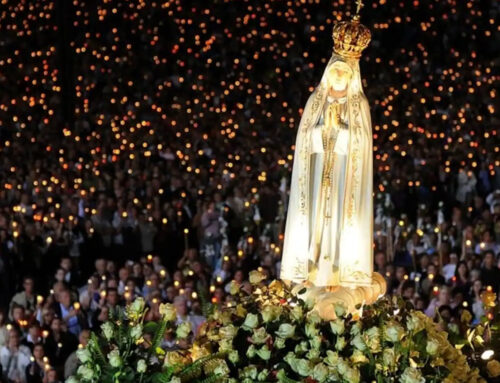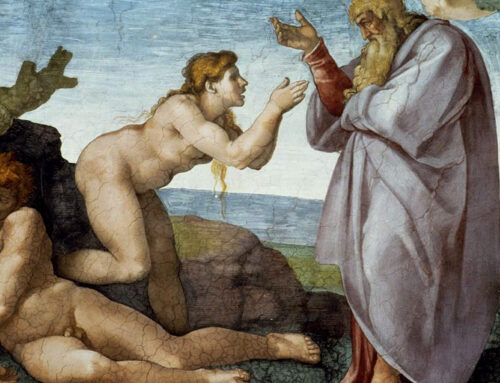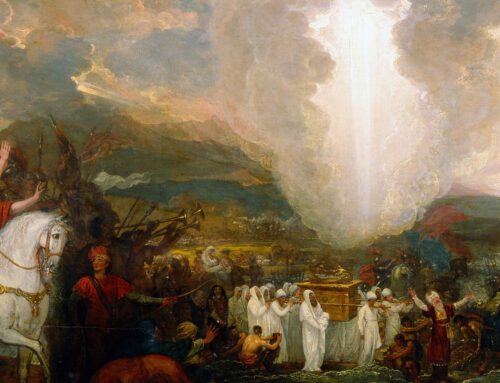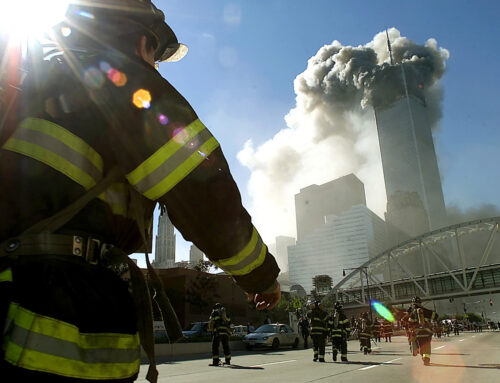Put yourselves in the shoes of the disciples from today’s Gospel.
Imagine Jesus telling YOU:
“Hey, I want you to go into the city right now. When you get there, you’ll see a guy who happens to be carrying a jar of water. Follow him. Yes… just follow him. I know it might feel kind of weird and awkward. Do it anyways. Follow him into whatever house he goes in. No, I’m not joking. Follow him into his house, and when you get there, ask for the master of the house. Tell him: The Teacher says, ‘where is my guest room where I may eat the Passover?’ Yes, I’m serious. I want you to invite yourselves into this guy’s house and tell him we need to crash his Upper Room. Just trust me. It’ll be awesome. Then come back when everything is ready.”
Would you do it? …Would you follow Jesus’ instructions?
I mean, I know I’d feel pretty uncomfortable!
But the disciples do it. They follow Jesus’ instructions. They might not understand why Jesus needed things done just so. They probably were confused and a little nervous — but they trusted Jesus. They had come to know and believe that Jesus was TRUSTWORTHY. He was worth believing… His words were true.
So they just did it. They, like the Israelites in our first reading from Exodus, said: “We will do everything that the LORD has told us”
…no matter how crazy!
But we kind of struggle with this, don’t we? We want to make sure we understand something perfectly, scientifically, logically… we want to know the why, the when and the how and just about every other detail before accepting instructions and following someone’s lead…
And yet the fact is that the Lord frequently requests all sorts of things that don’t make a lot of sense to us… that we don’t fully understand… that we really should just take His word on.
This is especially true when we consider the Mystery of the Holy Eucharist.
At every single Mass, at the express instruction of the Lord Jesus — “Do this in memory of me” — we bring bread and wine to the altar, and they become God.
Try wrapping your head around THAT one.
But still, we should trust Jesus. We ought to do what He told us to do, even if we don’t fully understand or comprehend it…
Of course, we can and do know many true things about the Eucharist. The Church’s Tradition DOES provide clarity on the mystery of the Eucharist in a variety of ways. One of the most noteworthy and helpful way is the use of two philosophical terms “substance” and “accidents,” which the Church borrowed from Aristotle’s metaphysics…
A “substance” is the “what-it-isness” of a thing.
The “accidents” are the properties or variables of that thing.
For example, a chair is a chair….that’s the SUBSTANCE of the thing. But a particular chair could be made out of wood. Or metal. Or plastic. It could have red cushioning. Or blue. Those are only the “accidents.” The accidents can be easily swapped out without changing the substance… It’s always a “chair.” That’s just what it “is.”
In the Celebration of the Holy Eucharist, we believe something amazing takes place. We hold that when we bring the substances of bread and wine to the altar, and an ordained priest prays the Eucharistic Prayer over them, the Holy Spirit CHANGES their substances, while leaving the accidents intact. We call this doctrine “Transubstantiation.”
…The “what-it-isness” of bread and wine simply no longer exist. There is only the substance of Jesus Christ — Body, Blood, Soul and Divinity.
But that’s where things get tough:
The accidents, the “properties” or the “qualities” of bread and wine, remain. And that’s what makes this mystery so hard for us to understand and so difficult to see…
…Because you can’t!
Perhaps this will come as some comfort to you:
If you look at the Eucharist and have trouble seeing Jesus — if you can only see bread — trust me… you’re not doing it wrong!
…That’s what it’s supposed to look like!
There’s no amount of trying hard enough or imagining hard enough or praying hard enough that will make you be able to see Jesus there with your own two eyes.
That’s where faith NEEDS to come in.
We see and experience Christ in the Holy Eucharist by faith.
St. Thomas Aquinas goes so far as to say that we can only detect Christ’s Presence in the Eucharist by faith alone! Sola fide! Ironically these words became one of the rallying cries of the Protestants during the Reformation that would ultimately lead so many people away from the Holy Eucharist!
Here are St. Thomas Aquinas’ exact words:
“The presence of Christ’s true body and blood in this sacrament CANNOT be detected by sense, nor understanding, but by faith alone, which rests upon Divine Authority.”
That last part about our faith resting on Divine Authority is crucial.
Faith is not unreasonable.
Faith is not a blind leap.
Faith is an act of trust.
…Trust in a PERSON — The Person of Jesus Christ.
We only believe in the Eucharist because we trust Jesus.
The Lord tells the disciples to go into the city and find some seemingly random guy carrying a jar of water… and they trust him. He tells them to follow this guy into a house and prepare the Passover in that particular Upper Room… and they trust him.
While at supper, Jesus takes bread and says ‘This is my Body’… and they trust Him. He takes a cup of wine and says, ‘This is My Blood’… and they trust Him.
St. Cyril, one of the early Church Fathers says this: “Do not doubt that this is true; instead accept the words of the Savior in faith; for since He is truth, He cannot tell a lie.”
Jesus would not — indeed, He CANNOT lie.
When He says: “This is my Body. This is my Blood” …He means it!!!!
There’s no use arguing! His words are clear and unambiguous!
We can only respond saying: “Lord, I don’t understand this truth perfectly. But I do trust You. And I have come to know and believe that You have the words of everlasting life. To whom else shall I go, Lord? What other choice do I have but to believe you?”
This is basically what we’re saying at that moment in the liturgy when the priest seemingly randomly says or sings: “The Mystery of Faith”
Mysterium fidei.
“What does that even mean,” you may wonder? I’ve often wondered that too. So I decided to do a little bit of research.
Turns out, in the old mass — in the Traditional Latin Mass — the words “mysterium fidei” were actually once part of the consecration narrative itself… The priest spoke over the chalice, saying: “For this is the Chalice of My Blood, of the new and eternal Covenant: the Mystery of faith: which shall be shed for you and for many unto the remission of sins.”
At Vatican II, the bishops decided to go back to a more strictly Scriptural version of Jesus’ words of institution and omit that little phrase “the mystery of faith” — because the Lord is not recorded as saying that in any of the four gospel accounts.
But because these words had been in the liturgy for so long — maybe even since the 6th Century — the Council Fathers wanted to keep them as part of the Mass somehow.
So we have the present form of the liturgy… After the consecration of the bread and wine which are now the Body and Blood of Christ, the priest announces: “The Mystery of Faith,” and the people all reply in unison with an act of faith:
“We proclaim your death O Lord, and profess Your Resurrection, until You come again.”
“When we eat this bread and drink this cup, we proclaim your death O Lord, until you come again.”
“Save us, Savior of the world, for by Your Cross and Resurrection, You have set us free.”
But let’s linger for a moment on that tiny little phrase:
The Mystery of Faith. Mysterium fidei.
We are in the Presence of a great Mystery here, laid out on the altar.
It’s the Mystery of the Real Presence. The Mystery of the Crucifixion. The Mystery of the Resurrection. The Mystery of ALL Salvation history… The Mystery of God’s intense, burning love for you and for me…It’s RIGHT HERE. The Source and Summit of our entire Christian faith is HERE!!!!!
THAT is totally beyond our capacity to fully understand… We CANNOT comprehend it.
But we can humbly accept it in faith. We can say AMEN… “It is true!”
We can be filled with wonder!!!
Wonder is so important.
Socrates said that “Wisdom begins in wonder.”
Wonder is that response we have to something we don’t fully understand and yet we have a pure, childlike delight and mysterious attraction toward. It’s that humble joy we experience when we are struck by something that points beyond ourselves…opens ourselves up to reality.
GK Chesterton once said: “The world will never starve for want of wonders; but only for want of wonder.”
When the cicadas started emerging a few weeks ago, I got caught up in wonder — I was captivated by them. How did all these weird little critters with red beady eyes KNOW when to emerge at the same time together after 17 years underground? That’s a natural wonder. That is AMAZING.
How much more wonderful — how much more AMAZING — is the Holy Eucharist than cicadas?
…Than anything else for that matter?
Absolutely nothing compares!
Pope St. John Paul II used to take about the need for “rekindling Eucharistic amazement” in our lives.
How often do we just sit in amazement… in wonder at the Holy Eucharist?
Not to dissect it or try turning it into a theological problem to solve by our own intellectual efforts… or make it a topic for apologetic debate…
No.
Just to ponder the Real Presence… the Person of Jesus.
In the Old Testament, when the Israelites first received the gift of the manna in the desert — bread from Heaven! A foreshadowing of the Holy Eucharist! — they asked a question: “What is it!?!?!” That’s what the word “manna” actually means… “What is it?”
In other words, they wondered.
They pondered.
They didn’t understand what this weird flaky stuff was that suddenly appeared on the ground… So they asked — “What is this?”
And in a way, that’s how we ought to approach the amazing Mystery of the Eucharist today, isn’t it? Especially on this Feast of Corpus Christi:
We come once again to this altar and ask: “What is this?”
“Who is this?”
“Who is this amazing Jesus that He would so lower Himself and become my food?”
“Who is this amazing Jesus — God and Lord of the entire Universe — that he would willingly become so small and so easily overlooked as THIS… for me? That He would become so insignificant as a flat little Host placed in the hands and on the tongues of lowly little sinners like us?”
This is a Very Great Mystery.
It’s the Mystery of Faith.
We should all fall silent in reverent wonder before such a great mystery.





Leave A Comment